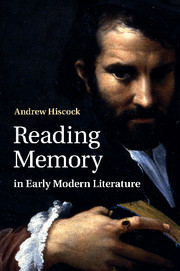Book contents
- Frontmatter
- Contents
- Figures
- Acknowledgements
- Introduction: ‘the dark backward and abysm of time’
- Chapter 1 ‘To seke the place where I my self hadd lost’: acts of memory in the poetry of Henry Howard, Earl of Surrey
- Chapter 2 ‘Remembre not (lorde) myne offences’: Katherine Parr and the politics of recollection
- Chapter 3 ‘Better a few things well pondered, than to trouble the memory with too much’: troubling memory and martyr in Foxe’s Acts and Monuments
- Chapter 4 Text, recollection and Elizabethan Fiction: Nashe, Deloney, Gascoigne
- Chapter 5 The Doleful Clorinda? Mary Sidney, Countess of Pembroke, and the vocation of memory
- Chapter 6 ‘Tell me where all past yeares are’: John Donne and the obligations of memory
- Chapter 7 ‘Of all the powers of the mind … the most delicate and fraile’: the poetry of Ben Jonson and the renewal of memory
- Chapter 8 ‘This art of memory’: Francis Bacon, memory and the discourses of power
- Notes
- Select Bibliography
- Index
Chapter 3 - ‘Better a few things well pondered, than to trouble the memory with too much’: troubling memory and martyr in Foxe’s Acts and Monuments
Published online by Cambridge University Press: 05 April 2014
- Frontmatter
- Contents
- Figures
- Acknowledgements
- Introduction: ‘the dark backward and abysm of time’
- Chapter 1 ‘To seke the place where I my self hadd lost’: acts of memory in the poetry of Henry Howard, Earl of Surrey
- Chapter 2 ‘Remembre not (lorde) myne offences’: Katherine Parr and the politics of recollection
- Chapter 3 ‘Better a few things well pondered, than to trouble the memory with too much’: troubling memory and martyr in Foxe’s Acts and Monuments
- Chapter 4 Text, recollection and Elizabethan Fiction: Nashe, Deloney, Gascoigne
- Chapter 5 The Doleful Clorinda? Mary Sidney, Countess of Pembroke, and the vocation of memory
- Chapter 6 ‘Tell me where all past yeares are’: John Donne and the obligations of memory
- Chapter 7 ‘Of all the powers of the mind … the most delicate and fraile’: the poetry of Ben Jonson and the renewal of memory
- Chapter 8 ‘This art of memory’: Francis Bacon, memory and the discourses of power
- Notes
- Select Bibliography
- Index
Summary
Better a few thinges well pondered, then to trouble ye memory with to much, you shall preuayle more with praying, the[n] with studying, though mixture be best. For so one shall alleuiate the tediousnes of the other. I entend not to contend much with them in wordes, after a reasonable account of my fayth geuen: for it shall be but in vayne. They will say, as theyr fathers sayd, when they haue no more to say. We haue a law, and by our law he ought to dye. Be ye steadfast and vnmoueable sayeth Saynt Paule, and agayne, persistito, stand fast. And how oft is this repeated, if ye abide, if ye abide. &c. But we shall be called obstinate, sturdy, ignorant, heady, and what not? So that a man hath need of much pacience, hauing to do with such men.
John Foxe, Acts and Monuments (1583), p. 1718This is just one of a number of interventions that John Foxe attributed to Hugh Latimer in his extended discussions with his fellow prisoner Nicholas Ridley in the year 1555. The ordeals of Latimer and Ridley in their journeys towards trial and execution number among the most famous and most often cited narratives of Foxe’s magnum opus described in the 1583 edition as the Acts and monuments of matters most speciall and memorable, happenyng in the Church with an vniuersall history of the same, wherein is set forth at large the whole race and course of the Church, from the primitiue age to these latter tymes of ours, with the bloudy times, horrible troubles, and great persecutions agaynst the true martyrs of Christ, sought and wrought as well by heathen emperours, as nowe lately practised by Romish prelates, especially in this realme of England and Scotland. In their exchanges both Latimer and Ridley not only seek to defend their doctrinal position in opposition to that of their Catholic persecutors, we also find them centrally concerned with diverse forms of remembering, and pondering the act of being remembered. Furthermore, in this, they are representative of a whole host of different martyrs portrayed throughout the huge collection. In direct comparison with many other Foxean ‘worthies’, Latimer is seen to subscribe to an Augustinian position whereby recollection may facilitate access to a higher spiritual truth and a renewed commitment to faith.
More broadly, throughout The Acts and Monuments it is made repeatedly apparent that the faculty of memory not only yields valuable insights into any understanding of human epistemology, it also constitutes an indispensable resource for true Christian worship. In the depiction above of his captivity, Latimer is discovered drawing upon his rhetorical training as a scholar: by recalling select fragments from scriptural apophthegms, the divine is seen to formulate an appropriate ethos, to shape a legitimate and authoritative self, with which to confront his accusers. Repeatedly exploiting such arresting images of the faithful beset by enemies, Foxe hailed both Latimer and Ridley as ‘two … speciall & singuler Captaines, & principall pillers of Christes Churche … of whose famous doinges & memorable learning, & incomparable ornaments & giftes of grace, ioyned with no lesse co[m]mendable sincerity of lyfe, as all the Realme canne witnes sufficiently’ (Acts [1583], p. 1717).
- Type
- Chapter
- Information
- Reading Memory in Early Modern Literature , pp. 90 - 112Publisher: Cambridge University PressPrint publication year: 2011



